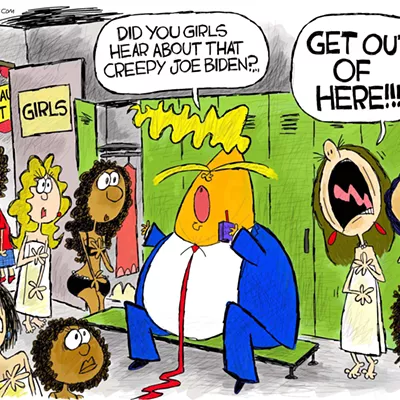But they differ on how they'd balance the books, with most of the Democrats arguing that the Bush tax cuts have been too generous to the wealthiest Americans, and the Republicans arguing that out-of-control spending is the real problem.
Before you dig into the candidates' positions, here are a few fun facts from the Concord Coalition, a nonpartisan deficit watchdog group:
· The deficit is expected to increase, not decrease, next year.
· The Bush administration's fiscal projections beyond 2007 do not include costs for such items as the wars in Iraq and Afghanistan.
· The Bush administration has consistently failed to meet fiscal projections. For example, 2003 budget projections called for a $61 billion surplus by 2005. Instead, we got a $318 billion deficit. The 2004 budget estimated a $201 deficit in 2006. Instead, we're looking at a $296 billion deficit.
· Interest on the national debt is the fastest-growing area of the federal budget.
· Tax hikes do not always slow economic growth. As Concord notes: "In the five years following the tax increases of 1993, annual real economic growth averaged 3.8 percent. In the five years since the tax-cut polices began in 2001, annual real economic growth has averaged 3.1 percent."
· The estate tax--dismissed as the "death tax" by many Republicans--now applies to assets of more than $2 million, which would have affected 1 percent of the people who died in 2004. The Joint Committee on Taxation estimates that a complete repeal of the estate tax will reduce revenues by $369 billion during the next 10 years.
· And all of this barely begins to address the issues related to Social Security and Medicare as baby boomers near retirement.
The six Democrats in the congressional race offer a wide range of opinions on ways to bring the federal budget under control.
Former state lawmaker Gabrielle Giffords says she'd support the repeal of most of the Bush tax cuts, which she says "favor the wealthy at the expense of the middle class. When you give special breaks to the wealthy, and at the same time we increase our spending and our borrowing, that's not an economic recipe that's going to lead to a sound economy."
Giffords says she supports tax changes that eliminated the marriage penalty and would retain cuts for lower-income Americans.
"We need to go back to the tax policies of the Clinton years," says Giffords, who wants to reverse tax breaks for oil companies, pharmaceuticals and other corporations.
Giffords supports keeping the estate tax with the current exemption of $2 million.
She cites the GOP's Medicare drug plan as an example of bad federal spending, because it didn't allow the government to use bulk-buying power to negotiate drug prices.
She's also critical of federal earmarks--"The classic example, of course, is the $200 million bridge to nowhere that connects a small Alaskan town to an island of 50 people"--and the expenses of the Iraq war, estimating that the United States is spending $9 billion per month.
"And when you look at who has these contracts, like Halliburton, and you look at what we're getting from these contracts, we're not getting a good return on that."
Patty Weiss, the former newscaster who is making her first foray into politics, says she would rescind the Bush tax cuts across the board.
"That tax cut benefits the top .5 percent of this country," says Weiss.
Weiss supports retaining the estate tax. "It keeps us from becoming an aristocracy," says Weiss, who adds that suggestions that family farms are being lost to the estate tax is a myth. She says the current $2 million threshold for the estate tax is about right.
While she doesn't offer specific areas of federal spending to cut, Weiss says any increases in federal spending should be offset by cuts elsewhere. For example, she'd push for higher payments from oil companies that are drilling on public lands.
Jeff Latas, a former Air Force pilot who is also making his first run for office, says "it's not practical at this point" to keep any of the Bush tax cuts.
"When you take a look at the debt that we're incurring in Iraq, in combination with the tax cuts--that is equal to the deficit, practically," Latas says. "If we had kept the taxes as they were in 1999, we could have conducted this occupation. Even though I'm against it--don't get me wrong--we could have afforded to conduct it."
Latas would support decreasing the threshold of the estate tax from $2 million. "I think it ought to come down a little bit," he says. "There are some exceptions to that rule" in the cases of family farms and businesses.
Latas would cut federal spending by pulling the United States out of Iraq and voting against pork-laden transportation bills.
Tucson Unified School District board member Alex Rodriguez says the federal government "needs to restore fiscal discipline."
Rodriguez says he would rescind the Bush cut for "the wealthiest among us" while preserving cuts for the middle- and lower-income households. "I would be very much in favor of looking at creative ways to provide tax incentives, tax credits to small businesses in our country, to American middle-class families who are again being squeezed in their pocket."
Rodriguez favors retaining the estate tax, but says the threshold "always poses an interesting question because--and I'll tell you honestly, I don't know yet, in part because I haven't done the specific analysis on the estate tax. If I become the U.S. representative, I will analyze what economic impact it would likely have to lower it or keep it at $2 million."
Rodriguez offers no specific federal cuts, but he believes "we should review and examine programs and their effectiveness. ... I believe there is fat in that budget in certain areas."
Francine Shacter, a retired U.S. Census Bureau employee, would simplify the tax system eliminating most of the current deductions. "I would re-jigger the whole thing so that those who made less, paid less," she says, "and those who made more, paid more."
She also opposes elimination of the estate tax--"I think that the aggregation of wealth and passing it on skews the whole economy of the country"--and thinks the current $2 million exemption is in the right neighborhood.
Shacter says the federal government should increase spending on "public welfare"--such as education or universal health care--and less on corporate welfare.
Bill Johnson, the Cochise County lawyer who has launched a dark-horse candidacy, is the odd man out among the Democrats. He favors making the Bush tax cuts permanent and repealing the estate tax altogether.
Johnson would balance the books with "major cutbacks in government spending at all levels of government. I would cut everything. I would dramatically cut military spending, and I would cut social programs as well."
All five candidates on the GOP side say they want to extend the Bush tax cuts permanently and repeal the estate tax.
State Rep. Steve Huffman, who has been endorsed by Kolbe, says: "I fully support extending and making permanent President Bush's tax-cut package. I think there's a lot of reasonable policy in there that's good for our economy. If we were to eliminate some of the things in there, it would have a negative impact on business, job creation, job expansion and may not necessarily do anything to reduce or eliminate the deficit."
To cut spending, Huffman says "we need to look at everything we're doing to see whether we're spending wisely." But he adds that no number of cuts will make much of a difference unless lawmakers tackle Social Security, Medicare and other entitlement programs with "long-term structural fixes."
Randy Graf, the former state lawmaker who got 43 percent of the vote in his 2004 primary run against Kolbe, says he wants to cut taxes as much as politically possible.
"I believe that every time we have done tax cuts, the economy has improved, and revenues have increased," Graf says. "I'm going to work under the premise that if government doesn't take money in the first place, then it's always better for the American public."
To balance the budget, Graf says the federal government should "stop coming up with new programs, particularly when we've got issues facing us."
Graf cites spending on No Child Left Behind and the GOP prescription-drug program as examples of the kinds of programs he would have voted against.
"There's an awful lot that government gets involved in, an awful lot of taxes that don't need to be collected," says Graf. "There's an awful lot of spending that's not necessary."
Mike Hellon, a former GOP national committeeman, says "the problem with the federal deficit is spending; it's not a revenue problem." He says the federal government needs to "rein in spending."
Hellon says he'd target earmarks as a way to cut spending, but he adds that "this thing has gotten so out of hand for so long that there's no magic bullet that's going to solve the problem."
Hellon says he's "ambivalent" on the estate tax. "I guess I would come down on the side of repealing it. There is good public policy for not allowing the nation's wealth to congregate in a limited number of hands over generations, but the extremely wealthy have figured out how to dodge that tax anyway. We might as well go ahead and relieve the burden on the smaller business people."
Hellon says he'd consider a compromise that would exempt the first $15 million or $20 million of an estate. "I wouldn't be offended by a substantial tax beyond that."
Mike Jenkins, the auto-shop manager who has lost bids for the Arizona Legislature and the Tucson City Council, says he'd keep make the Bush tax cuts permanent, "but we must be very, very careful about future tax cuts."
He also supports the repeal of the estate tax, because "I know too many farmers who have had to sell their farms when their parents died. ... I've talked to two."
If the full repeal of the estate tax isn't possible, Jenkins would like to raise the exemption to $5 million.
Jenkins gripes that the federal government is spending far too much.
"Everybody's heard the term 'spending like a drunken sailor.' I'll tell you what: I've never seen a drunken sailor spend this much, and I've seen a bunch of them in San Diego and stuff, and this is ridiculous."
To cut the budget, Jenkins says he'd target no-bid contracts--"who came up with that dumb-ass idea?" he wonders--the federal bureaucracy and "corporate pork projects" such as Amtrak and the post-Sept. 11 airline bailout.
"If you can't make it in the business world, you're doing something wrong," Jenkins says. "I do not believe it's the federal government's responsibility to bail out private corporations and industry."
Frank Antenori, the former Green Beret now working for Raytheon, says the Bush tax cuts have resulted in "money pouring into the treasury."
He says establishing an income tax was a big mistake.
"The Founding Fathers knew that imposing an income tax would bring this country down," he says. "We screwed up with the 16th Amendment when we allowed the federal government the ability to levy taxes on personal income."
Antenori favors a national sales tax and tariffs, which he says "would be far less regressive than income taxes."
He likewise says the estate tax should be repealed because "you should only pay taxes while you're alive."
He says he'd dramatically cut federal spending.
"The spending is out of control," Antenori says. "What has me more annoyed than anything is that the Constitution specifically spells out what we can spend money on. Half the stuff we're spending money on doesn't even have constitutional justification. Nobody really justifies it."











